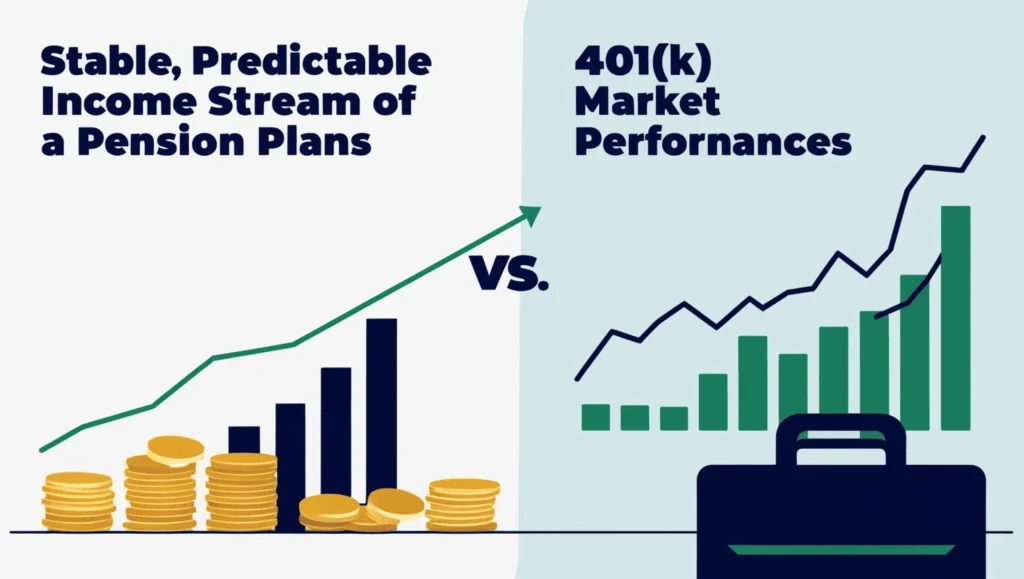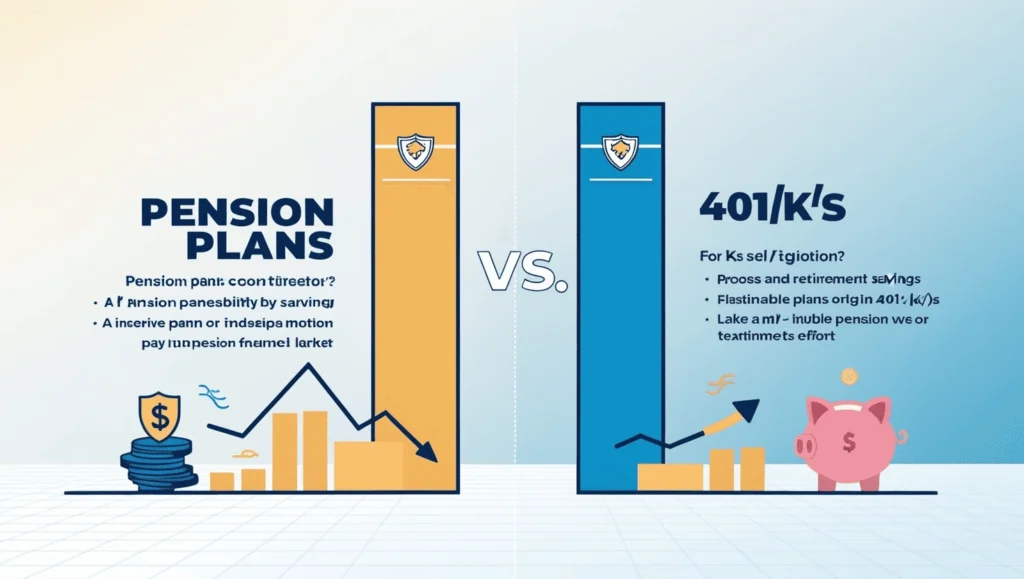Pension plan vs 401k: which one is right for you? Understanding the differences between these retirement savings options is crucial for making informed financial decisions.
Retirement planning is one of the most important steps you can take to secure your financial future. It ensures that you have a stable income and peace of mind during your golden years. When it comes to preparing for retirement, understanding the differences between a pension plan vs 401(k) is essential.
Pension plans offer a guaranteed income, often based on your years of service and salary, while 401(k) accounts provide flexibility and investment growth opportunities. Each option has unique benefits and drawbacks, and the right choice depends on your career path and financial goals.
By comparing these retirement options, you can make informed decisions to safeguard your future. Don’t leave your financial security to chance—take control today. For more details on retirement accounts, visit Investopedia’s guide to retirement planning.
What Are Pension Plans and 401(k)s?
Understanding the differences between pension plans and 401(k)s is essential when planning for retirement. Both options help you save for your future, but they operate in distinct ways. Let’s break down these two retirement savings tools and how they work.
What Is a Pension Plan?
A pension plan is a type of retirement account often provided by employers. It is also known as a defined benefit plan, meaning it guarantees a specific monthly income after you retire. This income is based on factors such as your years of service, salary history, and age at retirement.
For example, if you work for the same employer for many years, your pension income may grow significantly. The employer manages the plan and is responsible for ensuring that you receive the promised payments during retirement. Unlike other retirement accounts, you don’t have to make investment decisions for a pension plan.
However, pension plans come with some limitations. They are often not portable, meaning if you leave your job, you might lose access to the full benefits. Additionally, the stability of your pension depends on your employer’s financial health. Learn more about how pension plans work here.
What Is a 401(k)?
A 401(k) is another popular retirement savings account. It falls under the category of a defined contribution plan, where employees actively contribute a portion of their paycheck. These contributions are often made pre-tax, which helps lower your taxable income.
One of the most attractive features of a 401(k) is employer matching. Many employers match a percentage of your contributions, essentially giving you free money to grow your retirement fund. Unlike pension plans, a 401(k) allows you to choose how your money is invested, such as in mutual funds, stocks, or bonds.
The portability of 401(k)s makes them appealing. If you switch jobs, you can roll your 401(k) into another account without losing your savings. However, 401(k)s do come with risks, as the value of your account depends on market performance.Explore more details about 401(k) accounts here.

Key Differences Between Pension Plans and 401(k)s
When planning for retirement, understanding the key differences between pension plans and 401(k)s is crucial. Each option offers unique benefits and challenges, so knowing how they compare can help you make an informed decision. Below, we break down these differences into three main categories: structure and benefits, flexibility and portability, and risk factors.
Structure and Benefits
The primary distinction between a pension plan and a 401(k) lies in their structure and benefits. A pension plan is a defined benefit plan, meaning it provides guaranteed income upon retirement. This income is often calculated based on factors like your years of service, salary history, and age at retirement. Pension plans are managed entirely by employers, so you don’t need to make investment decisions.
In contrast, a 401(k) is a defined contribution plan. It grows based on contributions you make during your working years and the investment performance of the funds within the account. With a 401(k), you have the opportunity to increase your retirement savings through employer matching and tax-deferred growth.
Both options offer tax advantages. Contributions to a traditional 401(k) are typically made pre-tax, reducing your taxable income. Similarly, pension contributions are often funded by employers with tax-deferred growth until retirement. However, Roth 401(k)s allow after-tax contributions, enabling tax-free withdrawals later.
Flexibility and Portability
Flexibility is another key difference when comparing a pension plan vs. a 401(k). Pension plans are often tied to a single employer, which makes them less portable. If you change jobs, you may lose access to future accruals unless the pension is vested, which usually takes several years. This lack of portability can be a disadvantage if you anticipate switching employers during your career.
On the other hand, a 401(k) is highly portable. If you leave your job, you can roll over your 401(k) funds into an individual retirement account (IRA) or another employer-sponsored plan. This portability makes the 401(k) an attractive option for individuals who prioritize flexibility and career mobility.
Risk Factors
When assessing risk, the differences between pension plans and 401(k)s become evident. With a pension plan, the employer bears most of the financial responsibility. They must ensure the fund is adequately managed to meet the promised retirement payouts. However, this reliance on the employer’s financial health can pose a risk. If the company goes bankrupt or mismanages the fund, your benefits may be affected.
In contrast, with a 401(k), the responsibility shifts to you, the account holder. You must make investment choices and manage the associated risks. Market fluctuations can impact your account’s value, making your retirement income less predictable. For individuals comfortable managing investments, this can be an opportunity to grow their savings. However, it also means assuming the risk of poor investment performance.
Choosing between a pension plan vs. 401(k) involves weighing your priorities, such as stability, control, and career plans. To dive deeper into this topic, visit Investopedia’s Retirement Planning Guide or the IRS 401(k) Resources. These resources can help you further understand your options and make the best decision for your financial future.
Pros and Cons of Each Option
Choosing between a pension plan and a 401(k) can feel overwhelming. Each has its unique benefits and drawbacks, and understanding these is essential for making an informed decision. This section explores the advantages and disadvantages of both retirement options, helping you weigh which might be best for your needs.
Advantages of Pension Plans
A pension plan offers several advantages that make it appealing, particularly for individuals seeking financial stability in retirement.
- Guaranteed Income for Life
Pension plans provide a fixed income throughout retirement. This security eliminates concerns about running out of money, even if you live longer than expected. Unlike 401(k)s, the income from pensions doesn’t depend on market performance, which can be unpredictable. - No Personal Investment Management Needed
With a pension, you don’t have to worry about managing investments or monitoring market fluctuations. Employers or plan administrators handle the funds, ensuring you receive consistent payments. This hands-off approach is ideal for those who prefer simplicity and minimal involvement in financial planning.
For more insights on pension plans, check out this guide on defined benefit plans.
Advantages of 401(k)s
A 401(k) offers flexibility and growth potential, which appeals to many modern workers.
- Greater Control Over Investments
A 401(k) allows you to choose how your contributions are invested. Whether you prefer mutual funds, stocks, or bonds, you can tailor your portfolio to suit your risk tolerance and financial goals. This flexibility empowers you to grow your retirement savings based on your preferences. - Potential for Employer Matching and Tax-Deferred Growth
Many employers offer matching contributions, effectively boosting your savings. For instance, if your employer matches 50% of your contributions up to a certain limit, it’s like receiving free money toward your retirement. Additionally, 401(k) contributions grow tax-deferred, meaning you won’t pay taxes until you withdraw funds. This can result in significant savings over time.
Learn more about employer matching and 401(k) benefits.
Drawbacks of Both Options
While both plans have clear benefits, they also come with limitations.
- Pension Plans: Lack of Portability and Dependence on Employer Stability
A major drawback of pensions is their lack of portability. If you switch jobs frequently, you might lose access to your accumulated benefits. Additionally, pension plans rely on your employer’s financial stability. If the company faces financial difficulties or goes bankrupt, your pension could be at risk. - 401(k) Plans: Market Risks and Withdrawal Penalties
The biggest downside of a 401(k) is its dependence on market performance. Poor investment choices or economic downturns can significantly reduce your retirement savings. Moreover, early withdrawals (before age 59½) often incur a 10% penalty, along with income taxes. These penalties can diminish your savings if you face financial emergencies.
For more on managing risks in a 401(k), visit Fidelity’s retirement planning resources.

Factors to Consider When Choosing Your Retirement Plan
Planning for retirement requires careful thought, especially when comparing options like a pension plan vs. 401(k). Your decision will depend on your unique career path, retirement goals, and tax considerations. Here’s a closer look at the factors that can guide your choice:
Your Career Path
Your career stability is a major factor when deciding between a pension plan and a 401(k).
- Staying with One Employer: If you’re likely to work for the same employer for most of your career, a pension plan may be advantageous. Pension plans reward long-term employees by offering guaranteed income based on your years of service and salary. However, leaving your employer before you’re fully vested could reduce or eliminate your pension benefits.
- Multiple Job Changes: On the other hand, if you anticipate changing jobs frequently, a 401(k) might be a better option. A 401(k) account is portable, meaning you can roll it over into an IRA or your new employer’s plan when you switch jobs. This flexibility ensures your retirement savings remain with you, regardless of where you work.
If you’re still unsure, consider consulting a financial advisor to evaluate how your career path aligns with these options.
(Learn more about portability of retirement savings at IRS.gov)
Retirement Goals
Your vision for retirement plays a crucial role in choosing between a pension plan vs. 401(k).
- Guaranteed Income: If financial security and stability are your priorities, a pension plan could be ideal. With a pension, you’ll receive regular, predictable payments for life. This income stream acts like a safety net, particularly if you’re concerned about market volatility or outliving your savings.
- Higher Returns: If you’re comfortable taking on some investment risk, a 401(k) offers potential for higher long-term growth. With a 401(k), you can choose how to invest your contributions, often in stocks, bonds, or mutual funds. While the returns aren’t guaranteed, disciplined investing can lead to substantial growth over time.
Balancing guaranteed income and growth potential is essential. Some individuals supplement their 401(k) savings with annuities or other investments to achieve both.
(Explore more on investment options at Fidelity Investments)
Tax Implications
Understanding the tax advantages of each option can also influence your decision.
- Pre-Tax Contributions: A traditional 401(k) allows you to contribute pre-tax income, which lowers your taxable income now. However, you’ll pay taxes on withdrawals in retirement. This is beneficial if you expect to be in a lower tax bracket when you retire.
- Post-Tax Contributions: Pension plans are generally funded by your employer, but your contributions (if required) may also come from pre-tax earnings. If you’re considering a Roth 401(k), you’ll contribute post-tax income but enjoy tax-free withdrawals later.
Tax planning is a key part of retirement preparation. Work with a tax professional to determine whether pre-tax or post-tax savings are better for your situation.
(Check out retirement tax strategies on Kiplinger)

Making the Right Choice for Your Future
Choosing between a pension plan vs. 401(k) can feel overwhelming. However, understanding your options and tailoring them to your financial goals is key to building a secure retirement. In this section, we’ll explore hybrid strategies and the importance of seeking professional advice. These approaches will help you make informed decisions that align with your long-term objectives.
Hybrid Strategies: Combining the Best of Both Worlds
A hybrid strategy allows you to take advantage of the unique benefits offered by both pension plans and 401(k)s. Here’s how you can implement this approach:
1. Combine Pension Benefits with 401(k) Savings
If you’re fortunate enough to have access to both a pension plan and a 401(k), maximize their benefits. A pension provides predictable, guaranteed income in retirement. It’s especially valuable for covering fixed expenses, such as housing and healthcare.
On the other hand, a 401(k) gives you control over your retirement investments. You can choose how much to contribute, select your preferred investment options, and benefit from potential employer matching. Combining these plans ensures you have both stability and growth in your retirement portfolio.
2. Explore Supplemental Savings Accounts
Even with a pension or 401(k), it’s wise to diversify your savings. Consider opening an Individual Retirement Account (IRA) to boost your nest egg. Traditional IRAs allow for tax-deferred growth, while Roth IRAs offer tax-free withdrawals in retirement.
For those who are self-employed or lack access to employer-sponsored plans, a Solo 401(k) or SEP IRA can provide significant tax advantages and higher contribution limits. Diversifying across multiple accounts ensures you’re prepared for unexpected expenses or market fluctuations.
Pro Tip: Use online tools like 401(k) calculators or IRA contribution guides to evaluate your savings potential.
Seeking Professional Advice: Expert Guidance for Retirement Success
Navigating the complexities of retirement planning isn’t easy. Consulting a financial professional can make a big difference in your decision-making process. Here’s why professional advice matters:
1. Tailored Recommendations for Your Goals
A financial advisor can assess your specific situation, including your age, income, career stability, and risk tolerance. They’ll help you determine whether a pension plan, a 401(k), or a combination of both aligns best with your goals.
For example, if you’re early in your career, an advisor might recommend focusing on maximizing 401(k) contributions to benefit from long-term market growth. If you’re mid-career or close to retirement, they may suggest balancing your 401(k) with a guaranteed pension income for stability.
2. Guidance on Tax Implications
Retirement accounts come with varying tax rules. An expert can clarify the impact of pre-tax contributions in a 401(k) versus after-tax contributions in a Roth IRA. They’ll also explain how withdrawals will affect your tax liability in retirement.
Additionally, financial planners stay updated on legislative changes. They can advise on strategies to avoid penalties or optimize your required minimum distributions (RMDs) after age 73.
3. Assistance in Managing Investments
If you find investment decisions overwhelming, professional guidance can help. Advisors can recommend an appropriate mix of stocks, bonds, and mutual funds to match your risk tolerance and time horizon. They can also monitor and adjust your portfolio as needed.
Explore organizations like NAPFA (National Association of Personal Financial Advisors) to find fiduciary advisors who prioritize your best interests.
Conclusion
Understanding the key differences between pension plans and 401(k)s is essential for choosing the best option for your retirement. Pension plans offer guaranteed income, while 401(k)s provide flexibility and growth potential through investments. Consider factors like career stability, retirement goals, and tax implications when making your decision.
Assess your career path and financial objectives to determine which plan aligns with your needs. If you’re unsure, consult a financial advisor to explore your options and create a strategy that works for you.
Start planning today to build a secure future. Whether you prefer the stability of a pension plan or the control of a 401(k), taking action now is crucial. Visit IRS 401(k) Resources or Pension Rights Center for more information on retirement planning.
Your retirement begins with informed decisions—take the first step now!

1 thought on “Pension Plan vs 401(k): Understanding Your Retirement Options”